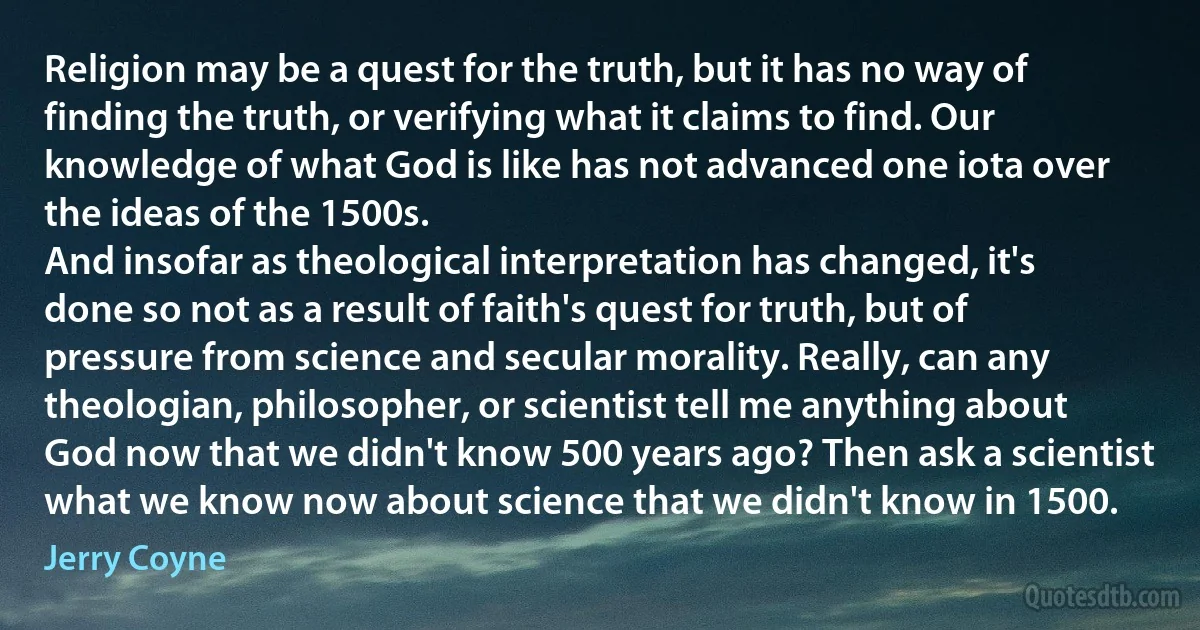Quest Quotes - page 7
There is the name and the thing: the name is a voice which denotes and signifies the thing; the name is no part of the thing, nor of the substance; 'tis a foreign piece joined to the thing, and outside it. God, who is all fulness in Himself and the height of all perfection, cannot augment or add anything to Himself within; but His name may be augmented and increased by the blessing and praise we attribute to His exterior works: which praise, seeing we cannot incorporate it in Him, forasmuch as He can have no accession of good, we attribute to His name, which is the part out of Him that is nearest to us. Thus is it that to God alone glory and honour appertain; and there is nothing so remote from reason as that we should go in quest of it for ourselves; for, being indigent and necessitous within, our essence being imperfect, and having continual need of amelioration, 'tis to that we ought to employ all our endeavour.

Michel de Montaigne
These thirty years, and more, that I've spent among exotic, barbaric, indomitable gods and goddesses, nourished on myths, obsessed by symbols, nursed and bewitched by so many images which have come down to me from those submerged worlds, today seem to me to be the stages of a long initiation. Each one of these divine figures, each of these myths or symbols, is connected to a danger that was confronted and overcome. How many times I was almost lost, gone astray in this labyrinth where I risked being killed... These were not only bits of knowledge acquired slowly and leisurely in books, but so many encounters, confrontations, and temptations. I realize perfectly well now all the dangers I skirted during this long quest, and, in the first place, the risk of forgetting that I had a goal... that I wanted to reach a "center."

Mircea Eliade
The trope was eminently Oakeshottian. Politics was not a battle of interests, or a quest for truth, or a voyage of progress – it was an aesthetic performance, to captivate an audience. But it was not high theatre (Oakeshott had also insisted that politics was a second-rate activity). It was more like commercial theatre, the drama of the boulevards that plays to our emotions or embarrassments – Rattigan rather than Racine, he explained. On this stage, Mount has certainly given us a stylish production. We might call it the comedy of reform.

Perry Anderson
The historical Jesus will be to our time a stranger and an enigma. The study of the Life of Jesus has had a curious history. It set out in quest of the historical Jesus, believing that when it had found Him it could bring Him straight into our time as a Teacher and Savior. It loosed the bands by which He had been riveted for centuries to the stony rocks of ecclesiastical doctrine, and rejoiced to see life and movement coming into the figure once more, and the historical Jesus advancing, as it seemed, to meet it. But He does not stay; He passes by our time and returns to His own. What surprised and dismayed the theology of the last forty years was that, despite all forced and arbitrary interpretations, it could not keep Him in our time, but had to let Him go. He returned to his own time, not owing to the application of any historical ingenuity, but by the same inevitable necessity by which the liberated pendulum returns to its original position.

Albert Schweitzer
This dogma had first to be shattered before men could once more go out in quest of the historical Jesus, before they could even grasp the thought of His existence. That the historic Jesus is something different from the Jesus Christ of the doctrine of the Two Natures seems to us now self-evident. We can, at the present day, scarcely imagine the long agony in which the historical view of the life of Jesus came to birth. And even when He was once more recalled to life. He was still, like Lazarus of old, bound hand and foot with grave-clothes - the grave-clothes of the dogma of the Dual Nature.

Albert Schweitzer
Kuhn's theory suffers from a fatal flaw. It explains the succession from one paradigm to another in sociological or psychological terms, rather than as having primarily to do with the objective merit of the rival explanations. Yet unless one understands science as a quest for explanations, the fact that it does find successive explanations, each objectively better than the last, is inexplicable.

David Deutsch
None of us will become perfect in a day or a month or a year. We will not accomplish it in a lifetime, but we can begin now, starting with our more obvious weaknesses and gradually converting them to strengths as we go forward with our lives. This quest may be a long one; in fact, it will be lifelong. It may be fraught with many mistakes, with falling down and getting back up again. And it will take much effort. But we must not sell ourselves short. We must make a little extra effort. We would be wise to kneel before our God in supplication. He will help us. He will bless us. He will comfort and sustain us. He will help us to do more, and be more, than we can ever accomplish or be on our own.

Gordon B. Hinckley


![Forgoing privacy in a quest for absolute safety is as harmful to a healthy psyche and life of an individual as it is to a healthy political culture. For the individual, safety first means a life of paralysis and fear, never entering a car or airplane, never engaging in an activity that entails risk, never weighing quality of life over quantity, and paying any price to avoid danger. [...] A population, a country that venerates physical safety above all other values will ultimately give up its liberty and sanction any power seized by authority in exchange for the promise, no matter how illusory, of total security. However, absolute safety is itself chimeric, pursued but never obtained. The pursuit degrades those who engage in it as well as any nation that comes to be defined by it. (Glenn Greenwald)](https://cdn.quotesdtb.com/img/quotes_images_webp/48/glenn-greenwald-above-absolute-425748.webp)
